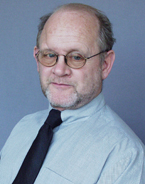Steel Wins Twenhofel Medal
October 13, 2016

Ron Steel of the Jackson School of Geosciences has won the Twenhofel Medal, the highest honor given by the Society for Sedimentary Geology. Steel, a professor and the Davis Centennial Chair in the Department of Geological Sciences, is a leader in the field of clastic sedimentology with a sustained record of fundamental contributions to the understanding of depositional systems ranging from fluvial through the coastal zone to deep-marine environments. Over his career, Steel has supervised more than 120 graduate students and postdoctoral fellows, many of whom have gone on to distinguished careers of their own.
“We are extremely proud of Ron,” said Jackson School Dean Sharon Mosher. “He has had a long and distinguished career as an exceptional researcher, educator and mentor. I can think of no one more deserving of this honor.”
Steel received both his bachelor’s and doctoral degrees from the University of Glasgow in Scotland. He currently holds positions at the Jackson School of Geosciences, where he built the dynamic stratigraphy group and has served as chair of the Department of Geological Sciences, and is also an Honorary Professorial Fellow at Heriot-Watt University in Edinburgh. His career spans five decades and includes positions at the University of Aberdeen in Scotland,
the University of Bergen in Norway, the University of Wyoming and at Norsk Hydro ASA, where he was the chief geologist.
Steel is known for being at the leading edge of new research developments, and publishing insightful, carefully documented studies that have advanced the development of emerging concepts, said longtime colleague Robert Dalrymple of Queen’s University.
Among Steel’s numerous publications are fundamental studies on sedimentation in rift basins and the associated alluvial-fan and fan-delta successions. He has also been at the forefront of research on autostratigraphy, and has made fundamental contributions to the study of tidal successions.
“Ron Steel is an intellectual giant in our field who has made many fundamental and lasting contributions to knowledge,”
Dalrymple said. “Our discipline is the richer for the contributions of this quiet yet incisive researcher.”
Back to the Newsletter